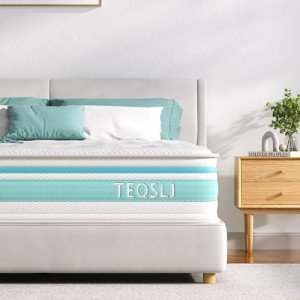Do You Think You're Suited For Doing Mattress With Memory Foam? Take This Quiz
The Benefits and Considerations of Memory Foam Mattresses
Memory foam mattresses have reinvented the sleep market, using an unique combination of comfort and assistance that adapts to the contours of the body. Known for their exceptional capability to ease pressure points, improve convenience, and lower motion transfer, these mattresses have actually become a popular choice for numerous people. This short article explores the numerous aspects of memory foam mattresses, including their advantages, factors to consider, and expert suggestions, assisting customers make informed getting decisions.
What is Memory Foam?
Memory foam, originally established by NASA in the 1960s, is a viscoelastic material that complies with the body shape of the sleeper. It is known for its special residential or commercial properties: high density and slow recovery, allowing it to take in weight and disperse pressure evenly while going back to its initial shape. This characteristic makes memory foam an ideal material for mattresses, offering support while minimizing pain.
Advantages of Memory Foam Mattresses
Memory foam mattresses provide many advantages that add to better sleep quality:
Pressure Relief: Memory foam contours to the shape of the body, alleviating pressure on sensitive areas such as hips, shoulders, and joints.
Spinal Alignment: Proper spinal positioning is vital for a great night's sleep. Memory foam mattresses supply balanced support, promoting a neutral spine position.
Motion Isolation: Memory foam takes in and isolates motion, making it an exceptional option for couples. Movement by one individual normally does not interrupt the other, enabling both individuals to delight in continuous sleep.
Hypoallergenic Properties: Many memory foam mattresses are resistant to allergens, allergen, and mold, making them an ideal option for allergic reaction sufferers.
Resilience: High-quality memory foam mattresses can last longer than traditional spring mattresses, keeping their shape and assistance over time.
Factors to consider When Choosing a Memory Foam Mattress
While memory foam mattresses have lots of advantages, possible buyers should likewise know specific considerations:
Heat Retention: Memory foam can retain heat, making some sleepers feel too warm. Lots of modern mattresses incorporate cooling technologies, such as gel-infused foam or breathable covers, to alleviate this concern.
Initial Odor: New memory foam mattresses can produce an initial chemical odor, typically referred to as off-gassing. This scent normally dissipates within a couple of days in a well-ventilated location.
Weight: Memory foam mattresses can be heavy, making them hard to move or establish without help.
Firmness Variation: Different brands and models use different firmness levels. It is important to evaluate a mattress's feel before buying to ensure it meets individual convenience preferences.
- * *
Feature
Memory Foam
Conventional Spring
Hybrid
Pressure Relief
Outstanding
Fair
Good
Motion Isolation
Outstanding
Poor
Good
Heat Retention
Moderate
Low
Low
Back Alignment
Exceptional
Fair
Great
Durability
Excellent
Moderate
Excellent
- * *
Kinds Of Memory Foam Mattresses
When exploring memory foam mattresses, it is essential to comprehend the various types readily available:
Traditional Memory Foam: The initial viscoelastic foam distinctively complies with the body however may retain heat.
Gel Memory Foam: Infused with gel particles, this foam provides a cooler sleeping surface while preserving contouring residential or commercial properties.
Open-Cell Memory Foam: Designed with a structure that permits air to flow through, open-cell memory foam offers much better breathability and lowers heat retention.
Plant-Based Memory Foam: Made with particular natural plant oils, these foams go for a smaller ecological impact and can have better breathability than traditional foam.
Tips for Selecting a Memory Foam Mattress
When choosing a memory foam mattress, think about the following ideas:
Test Before You Buy: Try out the mattress in-store if possible or guarantee it comes with a sleep trial.
Consider Your Sleep Position: Side sleepers may prefer a softer firmness to relieve pressure on their shoulders and hips, while back and stomach sleepers may take advantage of a firmer mattress to preserve back positioning.
Inspect Warranty and Return Policy: An excellent warranty can protect your financial investment, and a flexible return policy uses assurance.
Research Brands: Look for credible brand names with positive customer reviews and rankings from independent sources.
Regularly Asked Questions (FAQs)
**1. The length of time do memory foam mattresses last?Most high-quality memory foam mattresses have a lifespan of 10 to 15 years with proper care. 2. Can memory foam mattresses be
flipped?Most memory foam mattresses are created
to be single-sided and do not need turning. However, rotating the mattress can aid with wear. 3. Memory Foam Mattress Retailer ?Yes, memory foam mattresses tend
to be much heavier than standard spring mattresses due to their thick materials. 4. Can memory foam mattresses get too hot?Some people find memory foam keeps heat. Look for gel-infused or
**open-cell foam choices for more breathability. 5. Exist financing choices for purchasing a memory foam mattress?Many merchants provide funding plans, allowing consumers to break the overall expense into workable payments. Memory foam mattresses have emerged as a prominent option for those looking for
comfort and assistance in their sleep environment. With a myriad of alternatives and functions offered, consumers can
successfully discover the best mattress to satisfy their requirements. Understanding the benefits, factors to consider, and various types of memory foam will equip purchasers with the understanding to make an informed choice. As the demand for quality sleep continues to increase, memory foam mattresses will unquestionably play a considerable role in improving sleep health and total well-being.  ****
****